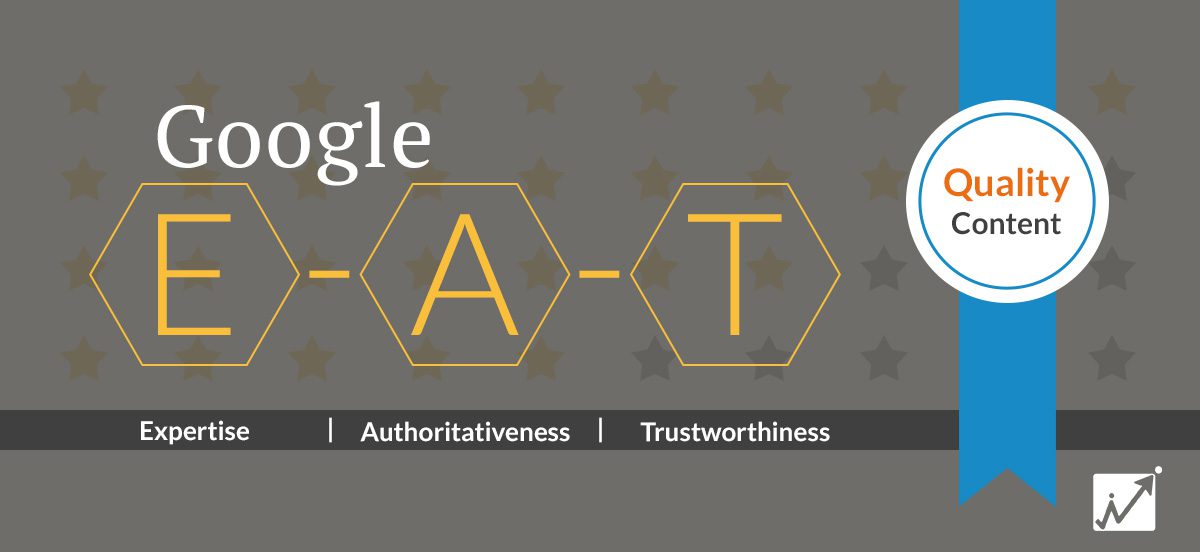E-A-T stands for Expertise, Authority and Trust, three values that Google has always appreciated in the content of a web page, a vital concept for a website to stand out from the competitors. But more and more, the most important search engine on the web is focusing on these three concepts.
What’s EAT and why it’s important
EAT is part of Google’s ongoing attempts to prevent us from messing with the system by forcing us to create quality useful content. In this way, websites, companies and content creators are under continuous observation. The goal is to improve web content for human users.
E-A-T places great emphasis on three values in particular:
- Experience, expertise
- The authority
- Integrity and trust.
It is another key element for low-quality spam content. Rewarding those who create content based on experience, authority and trust.
It’s simple: If website owners can demonstrate their expertise, authority and integrity, Google can rank pages correctly and users receive the high-quality content that actually matches their queries.
In fact, Google often makes small adjustments to its ranking algorithm, but EAT is not a simple update (as Panda or Penguin were). EAT is an ongoing process of refinement to ensure the right pages are classified.
It’s no surprise to say that this ranking factor has affected all sites on the Internet and that’s why it’s important to keep up with Google’s EAT updates.
How long does EAT exist?
It is difficult to say when Google announced the implementation of these monitoring protocols. The answer to this question differs from the SEO blog you are consulting.
The truth is that the first rumors about the EAT appeared in the blogs of SEO observers throughout 2013 and on March 29 of that same year, Google mentioned the YMYL pages (sites that are particularly sensitive due to the content of their website or their services or functionalities) for the first time in version 4.1 of its Search Rating Manual. This announcement passed quite unnoticed by most SEO analysts at the time.In 2014, Google’s Search Quality Evaluation Guide version 5 was leaked. It stated that experience, authority and trust in websites were given higher priority.
A few years later, in 2018, the QRGs, the guidelines for quality evaluators, updated to emphasize the beneficial purpose and reputation of the content creator. In August, the Medic update fell and many blogs made the mistake of thinking that this was the introduction of EAT. But the truth is that EAT had already been operable for five years.
Google EAT, the score that is not a score
As Gary Illyes recently remarked, there is no single score for EAT. EAT is composed of many baby algorithms that give rise to Google’s central algorithm. It is a gradual introduction of several interconnected concepts, along with several algorithm adjustments that change the ranking of sites as a result. Below is a breakdown of each aspect:
The value of experience
Content creators should have demonstrable experience in the relevant areas and should not disseminate misinformation. Likewise, they should avoid unsubstantiated claims and, if they do, they should be pointed out.
The content must answer the questions asked by users, demonstrating knowledge while taking advantage of the real demand for information. On the other hand, the credentials that support that experience must be exposed.
The importance of authority
Google wants to ensure that a website is supported by others in the same industry and that content creators are valued for their skills and opinions. The main content of a website has to be relevant in its widest sense in order to contribute to the overall authority of the site on a topic.
Authors should be named and their writings should appear in other places. These citations should be numerous and, if possible, from sites that are considered authoritative.
Trust it’s the key
A website should provide as much information as possible to eliminate all doubts of a user or a potential customer. Google strives to ensure that all SERP sites are reliable and that users’ needs are quickly and fully met.
The content of About Us pages must present real information about organizations and people. Google Maps integrated into the web must show real physical premises, so that potential customers can see that they are dealing with a real organization. The information of the Customer Service of an e-commerce company must show the transactions process, with privacy policies and return policies to show the potential customers that they have resources.
The HTTPS connection should be the default when payments are made, and logos of accepted payment methods should be displayed correctly to assure people that their money is secure. Ratings and comments should also be displayed to show that other customers have committed to a business and are satisfied. Or awards and other recognition from industry bodies to show recognition and appreciation.
How to increase your EAT score
With a few changes it’s very easy to increase the EAT score of a website:
Create consistently high quality and shareable content
- Avoid clickbait titles. Being punished in the ratings is not worth the few extra clicks you can get.
- Publish regularly.
- Use named authors.
- Attribute content to real authors, preferably those who have written elsewhere. Link to your other work and, when relevant, use outline markup to display your other web presences.
- Stay on topic. (If we write about SEO, PPC, digital marketing, etc., a post about baking the perfect cupcake would be out of place on our blog and confuse potential readers.)
- Write primarily with the human reader in mind, rather than the algorithm.
- Use keywords, but only when they occur naturally when writing about the topic.
- Research to make sure the keywords you are writing are the right ones.
- Use fonts. You can access the abstracts of most journal articles, so if you are writing about something scientific, it is not difficult to back it up.
Signs of trust you need on your site
- Any prize you have won.
- Any client you’ve worked with, the bigger and more recognizable, the better.
- Publications and websites where your products, services or content have been presented.
- Any association memberships.
- Signs of ethical trust, things like paying a living wage. This takes advantage of the Halo Effect: people will think that if you pay your staff fairly, you’ll probably do other good things too.
- Payment logos for all methods users can use to pay.
- Qualifications of any staff member, where relevant.
- HTTPS to show that your site is fully protected.
- Social proofs: reviews, star ratings, testimonials and more. From real people.
- Guarantees: “money back”, “no objections”, etc.
- Using only positive reviews can make people suspicious. Follow the careful line between the trust generated by reviews and the suspicion generated by positive reviews alone.
How to increase the authority of your site
- If you have an e-commerce and you sell products, ask your customers to check the things they have bought. This real life feedback (hopefully positive) will alleviate the concerns of potential customers and show that your audience agrees with what you do.
- Look for feedback outside the Google ecosystem. Reviews and mentions of non-Google services will contribute to your authority and reputation.
- Ask for testimonials. If you don’t sell products and your service doesn’t lend itself to featured comments, ask for written feedback and promote it on your website.
- Ask people to spread the word. If they are satisfied with your product or service, perhaps they will be happy to give you recommendations?
- From a content perspective, you can increase your authority by being more selective with guest content.
As we have seen, EAT is designed to ensure that the websites and the content they host are written by experts, are authoritative, and are reliable. And that others agree. But it only requires a small adaptation effort and ultimately, SEO is a constant evolution.

